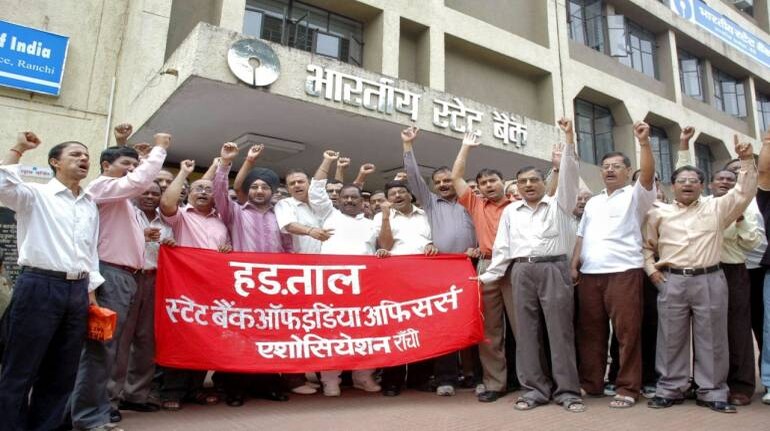



With bank unions joining, the two-day nationwide strike called by central trade unions has apparently halted banking transactions worth at least Rs 18,000 crore.
While about six lakh cheques could not be cleared in the southern grid functioning in Chennai, the number at the national level rose to 20 lakh such transactions, the All India Bank Employees' Association (AIBEA) said on March 29.
“In the southern grid functioning in Chennai, during our strike yesterday and today, about 6 lakh cheques/instruments worth about Rs 5,000 crore could not be sent for clearance as branches did not function due to the strike. At the national level, about 20 lakh cheques worth about Rs 18,000 crore could not be cleared. Normal banking services were affected due to the strike,” said CH Venkatachalam, General Secretary of the AIBEA.
AIBEA is one of the national umbrella bodies of bank employee unions.
“While we regret the inconvenience caused to the banking public, we are sure that they will appreciate the cause behind our strike in defending public sector banking, which alone is the main engine for the broad-based economic development of our country, besides providing safety for people’s savings and extending loans to the ordinary masses and needy sectors,” Venkatachalam added.
AIBEA said bank employees are unhappy with the “decision of the government to privatise” a few of the banks. Lakhs of young employees and officers have joined public sector banks after a very tough recruitment process and many have left IT and other private sector jobs and joined government-owned banks only due to the job security these banks offer, he added.
“Hence the government’s plan to privatise banks is a rude shock and highly demoralising,” AIBEA added.
The umbrella body of the bank unions said the demand for scrapping the new pension scheme has also become popular with young employees. “When the government is unable to control inflation and price rise, they also deserve a defined pension linked to cost of living. This is an important demand of our strike.”
AIBEA also said that it is against increasing outsourcing of regular bank jobs to contract employees. “There are around 473,000 business correspondents who are contract employees and do not have regular pay scales and service conditions like permanent employees even though they also do the same job,” it added.
At least 10 central trade unions have been observing a two-day nationwide strike since March 28 morning to protest against what they call the government's anti-farmer, anti-workers and anti-people policies.
On day one, its impact was partial. While states like Kerala, Tamil Nadu, Odisha witnessed large-scale protests, in bigger cities like Delhi and Mumbai, the impact was minimal.
The joint forum of central trade unions said on March 28 that a bandh-like situation prevailed in at least eight states. "There is a bandh-like situation in Tamil Nadu, Kerala, Puducherry, Andhra Pradesh, Telangana, Odisha, Assam, Haryana and Jharkhand," the forum said in the evening.
According to the forum, protest demonstrations were held in many industrial areas across states such as Goa, Karnataka, Maharashtra, Chhattisgarh, Punjab, Bihar, Rajasthan, West Bengal, Meghalaya and Arunachal Pradesh.
Discover the latest Business News, Sensex, and Nifty updates. Obtain Personal Finance insights, tax queries, and expert opinions on Moneycontrol or download the Moneycontrol App to stay updated!
Find the best of Al News in one place, specially curated for you every weekend.
Stay on top of the latest tech trends and biggest startup news.